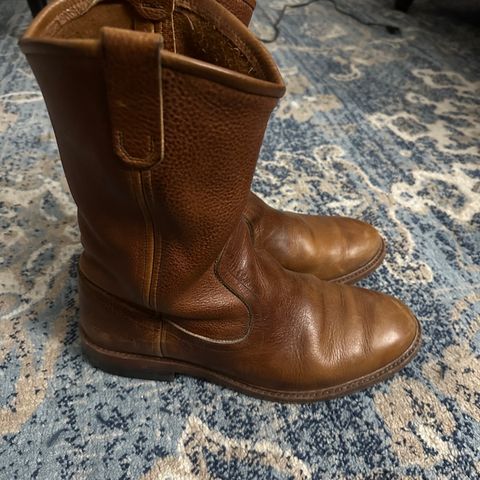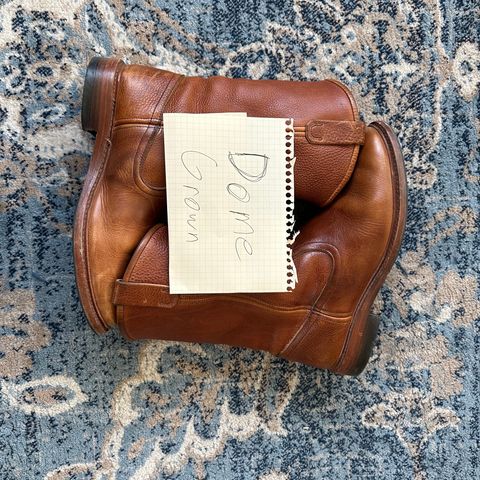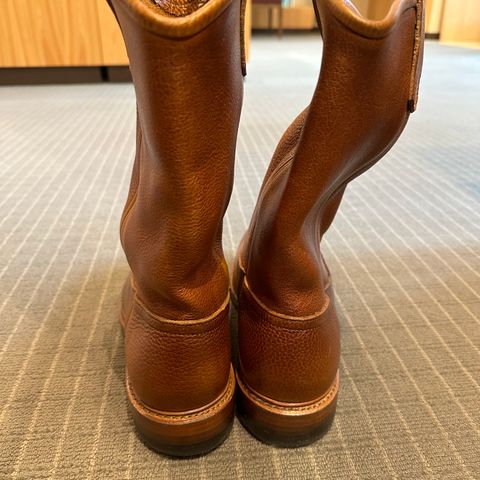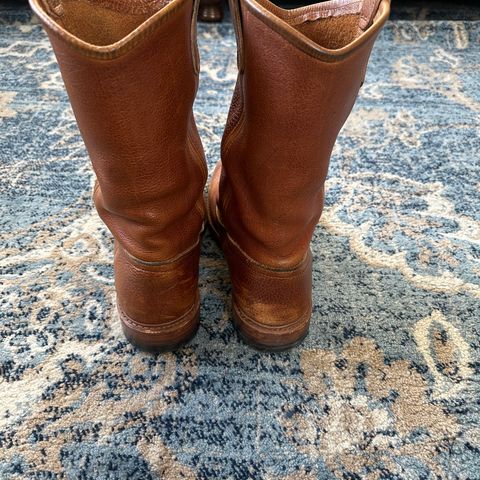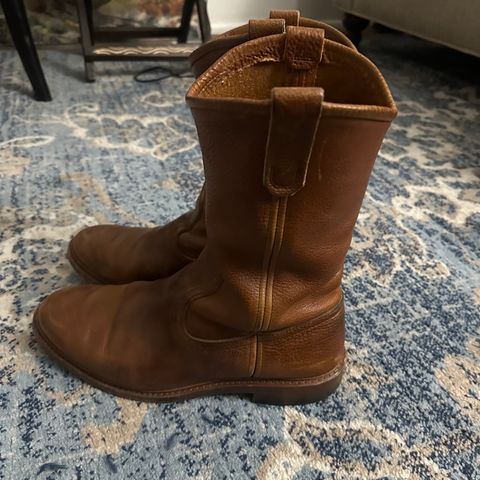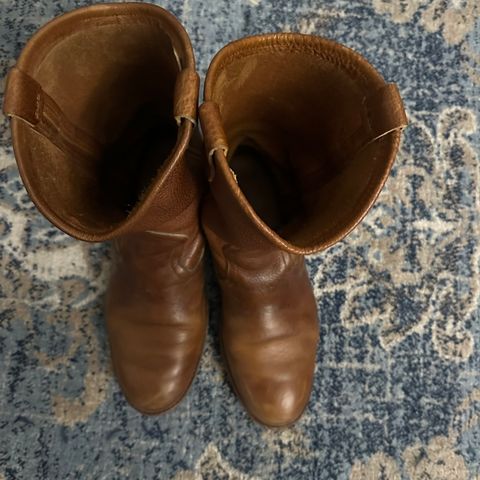About
The Dallas Roper is a western-style boot manufactured by Allen Edmonds and built on the company's 2019 footwear last. The boot combines traditional roper functionality with Allen Edmonds' signature 360° bench welt construction and premium materials sourced from renowned tanneries. Available in both standard and low-height variants, the Dallas Roper features leather uppers from Chicago's Horween tannery and leather outsoles with rubber toe and heel panels for enhanced traction.
About
The Dallas Roper is a western-style boot manufactured by Allen Edmonds and built on the company's 2019 footwear last. The boot combines traditional roper functionality with Allen Edmonds' signature 360° bench welt construction and premium materials sourced from renowned tanneries. Available in both standard and low-height variants, the Dallas Roper features leather uppers from Chicago's Horween tannery and leather outsoles with rubber toe and heel panels for enhanced traction.
The boot follows the classic roper design principles established in the 1940s for rodeo riders, featuring a shorter heel and round toe that facilitate the transition from mounted riding to ground work. Allen Edmonds' interpretation maintains these functional characteristics while incorporating the company's traditional dress shoe construction methods and recraftable design.
Construction and Materials
Build Quality
The Dallas Roper employs Allen Edmonds' 360° bench welt construction method, creating a durable bond between the upper, welt, and sole. This construction technique involves 212 individual steps during manufacturing and requires the attention of 48 pairs of hands throughout the production process. Each boot is handcrafted at Allen Edmonds' Port Washington, Wisconsin facility using imported materials.
The construction allows the boots to be recrafted by Allen Edmonds experts, extending their functional lifespan through professional restoration services. This process can typically be performed multiple times during the boot's lifetime, making the Dallas Roper a long-term footwear investment.
Materials
The Dallas Roper features upper materials crafted from pebbled grain leather sourced from Chicago's Horween tannery, known for its subtle tonal color variations and durability. Weatherproof British suede options are also available, providing alternatives for different climate conditions and style preferences.
Interior construction includes a leather-lined design with CustomCork insoles that gradually mold to the wearer's foot shape over time. The outsole combines traditional leather construction with modern functionality, featuring leather soles with strategic rubber panels positioned at the toe and heel areas for improved traction on various surfaces.
Heritage and Design
Roper Boot Origins
The roper boot style originated in the 1940s as a specialized adaptation of traditional western footwear for rodeo calf ropers. This design emerged from the practical needs of cowboys who required footwear that functioned effectively both in the saddle and during ground-based activities such as running after cattle during roping events.
The development of the roper style was influenced by rodeo regulations implemented by the Rodeo Cowboys Association, which required proper western attire for all contestants. This ruling addressed earlier practices where calf ropers wore tennis shoes for better ground mobility, creating demand for western boots that could provide similar functionality while meeting dress code requirements.
Design Characteristics
The Dallas Roper incorporates the essential design elements that define the roper boot category. The boot features a short shaft height that extends above the ankle but remains below the mid-calf, typically measuring approximately 10.5 inches for the standard version and 8.5 inches for the low variant.
The heel design follows traditional roper specifications with a low, squared-off profile typically measuring less than one inch in height. This heel configuration was specifically developed to ease the transition between stirrup use while mounted and running on foot. The round toe design provides additional comfort and functionality compared to the pointed toes that became popular in western footwear during the 1940s.
Pricing and Availability
Current Market Positioning
The Dallas Roper retails for $595 through Allen Edmonds' official channels as of 2024. This pricing positions the boot within the company's premium footwear range, reflecting the handcrafted construction methods and premium material sourcing.
Factory second versions are available through Allen Edmonds' Shoe Bank outlet program at reduced prices, typically offering access to boots with minor cosmetic imperfections that do not affect structural integrity or functionality. These factory seconds provide an entry point for customers seeking Allen Edmonds construction quality at lower price points.
Style Options
The Dallas Roper is offered in multiple leather and color variations to accommodate different style preferences. Available options include Cheyenne Brown leather, Burnt Sugar suede, Husk leather, and snake print leather variants. The boot is manufactured in two height configurations: the standard Dallas Roper Boot and the Dallas Roper Low Boot, providing choices for different aesthetic and functional requirements.
Sizing follows Allen Edmonds' classic fit guidelines, with the recommendation to order normal shoe size. The boot is distributed through Allen Edmonds retail locations, authorized dealers including Sherman Brothers, Franco's Fine Clothier, and major department stores such as Neiman Marcus and Nordstrom.
References
"Dallas Roper Boot | Men's Boots". Allen Edmonds. Retrieved September 19, 2025.
"Men's Dallas Roper Low Boot". Allen Edmonds. Retrieved September 19, 2025.
"Men's Factory Second Dallas Roper Boot". ShoeBank. Retrieved September 19, 2025.
"Our Legacy". Allen Edmonds. Retrieved September 19, 2025.
"The History Of Cowboy Boots". Western Boot Barn. Retrieved September 19, 2025.
"Ropers Story". Justin Boots. Retrieved September 19, 2025.
"What Are Roper Boots?". Ariat. Retrieved September 19, 2025.
"What are Roper Boots? Roper Boots vs. Cowboy Boots". Tecovas. Retrieved September 19, 2025.
"Allen Edmonds Dallas Roper Boot Cheyenne Brown Leather". Sherman Brothers Inc. Retrieved September 19, 2025.
"Allen Edmonds Men's Dallas Leather Western Roper Boots". Neiman Marcus. Retrieved September 19, 2025.
"Dallas Roper Low Croc Embossed Western Boot". Nordstrom. Retrieved September 19, 2025.
"Allen Edmonds Dallas Suede Roper Boot Burnt Sugar". MensDesignerShoe.com. Retrieved September 19, 2025.
"Allen Edmonds Dallas Leather Roper Boots Husk". MensDesignerShoe.com. Retrieved September 19, 2025.
"Allen Edmonds". Caleres. Retrieved September 19, 2025.
